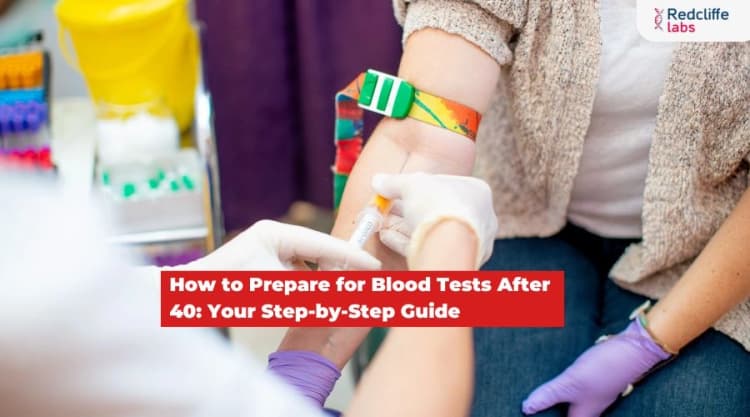Blood
Unlock special
discount on
this package
Login to Unlock 🔓
NABL Accredited lab*

Booking Benefits Unlocked Worth FREE 799

Report Consultation

Diet Plan
*Available once your report is generated.
At Redcliffe Labs, we have a single goal: to give India its right to quality diagnostics.
Customers served
Tests Processed Everyday
Cities
Collection Centres
World Class In-house Labs
Home Collection Experts
1 Test Parameters
Alpha Fetoprotein (AFP), Maternal Marker
1 PARAMETER INCLUDED
1 PARAMETER INCLUDED
- Alpha Fetoprotein (AFP), Maternal Marker
Top Booked Health Checkup Packages
Reports in 12 hours
|Parameters 94
Reports in 12 hours
|Parameters 96
Reports in 12 hours
|Parameters 89
Reports in 12 hours
|Parameters 96
Reports in 12 hours
|Parameters 90
Helps you know your test better
Q. What is Alpha-Fetoprotein?
Q. What Does Alpha-Fetoprotein Blood Test Show?
Q. What Are normal Alpha-Fetoprotein Levels?
Q. What Happens During AFP Tumor Marker Test?
Verified by Medical Expert

WRITTEN BY
Sheena Mehta

MEDICALLY REVIEWED BY
Dr. Pradeep Lodha
Table of Content
Introduction to Alpha-Fetoprotein (AFP), Maternal Marker Test
Alpha-fetoprotein (AFP) is a protein created by the baby's liver and yolk sac, and it can be found in the developing baby's blood while it is still in its mother's womb. Besides, this protein can also be detected in a pregnant mother's blood and serves as a key maternal marker in prenatal testing, helping assess the health and development of the fetus and screen certain birth defects and chromosomal abnormalities. This AFP Test helps measure the AFP concentration in the mother's blood to help get insights into the well-being of the developing baby. Neither too high nor too low AFP levels are good and indicate potential health issues or abnormalities. Suggested during the second trimester of pregnancy, the AFP Blood Test is not definitive but indicates the problem. Depending on your AFP Test results and other clinical evaluations, your doctor may prompt further tests to confirm or rule out specific conditions.
As a routine prenatal screening, the AFP Test in pregnancy helps assess the risk of certain chromosomal abnormalities or birth defects. Redcliffe Labs is your diagnostic partner, and you can choose us to book the Alpha Fetoprotein Test at the most affordable rates. We keep up with industry standards and follow ethical testing measures to maintain accuracy in the test results. Furthermore, our prices are the lowest, and our quality is the highest, making us the best Omnichannel Pan Inida Diagnostic Service Provider. So, diagnose yourself soon with the best diagnostic lab in India, Redcliffe Labs.
Test Details:
|
Also Known As |
Total AFP Test, Serum AFP Test, Maternal Marker Test |
|
Purpose |
Measure AFP levels in pregnant women to check the baby’s risk for having certain chromosomal abnormalities |
|
Preparation |
Do not drink alcohol or smoke before the test |
|
Fasting |
No Fasting Required |
|
Get Reports Within |
Same Day |
|
Cost |
INR 900 |

Purpose Of An Alpha-Fetoprotein Test in Pregnancy:
As a crucial part of prenatal care, it serves several purposes, including:
- Assess Fetal Health: One major purpose of the Alpha Fetoprotein Pregnancy Test is to assess the overall health of the fetus and help identify abnormalities.
- Screen Chromosomal Abnormalities: Abnormal AFP levels usually indicate chromosomal defects that prompt further tests to confirm the diagnosis.
- Screen Neural Tube Defects: While measuring Alpha-Fetoprotein levels, the test helps diagnose neural tube defects in the developing fetus that affect the brain and spinal cord development.
- Monitor Multiple Pregnancy: If you are pregnant with twins, triplets, or higher-order multiples, the AFP test helps assess the health of each fetus and diagnose potential complications.
Abnormal AFP Tests indicate problems and prompt the need for further evaluation. Getting tested as suggested is essential to diagnose the problem early and make informed decisions about your pregnancy. So, do not delay and book an AFP Lab Test with Redcliffe Labs today.
Reasons You May Need An Alpha-Fetoprotein (AFP) Test in Pregnancy:
- Routine Prenatal Screening: During the second trimester, between 16 and 22 weeks of the pregnancy, the AFP Test is used as part of a routine prenatal screening to assess the health and development of the fetus inside the mother's womb.
- Advanced Maternal Age: While it is a critical part of routine prenatal screening, the AFP Blood Test is highly recommended for pregnant women 35 or older. It may increase your risk of having a baby with certain chromosomal abnormalities, and this test may help assess that risk.
- Family History: Also, your doctor may prompt the need for an Alpha-Fetoprotein Blood Test for those with a family history of birth defects, particularly neural tube defects, as it increases your likelihood of having a baby with such problems.
- Previous Pregnancy Complications: Your doctor may suggest an AFP Test Pregnancy if you have had previous pregnancies with certain birth or chromosomal defects. It helps assess your risks of having a baby with certain birth defects, allowing you to make informed pregnancy-related decisions.
- Multiple Pregnancy: Besides birth defects, women carrying multiple fetuses may be more likely to have elevated AFP levels and may be asked to get tested to determine the cause and rule out other risk factors.
- Existing Health Conditions: If a pregnant woman already has chronic conditions, like diabetes, gestational diabetes, or certain liver problems, your doctor may prompt the need for AFP Testing.
- Abnormal Ultrasound Findings: Your doctor may also highly recommend an AFP test if your other test results or ultrasound findings show abnormalities.
It is essential to understand that the AFP Test is a screening test that can only indicate the problem related to birth defects but cannot confirm them, and doctors may suggest additional tests for accurate diagnosis.

What does the AFP Test result mean?
An abnormal AFP test result indicates a higher likelihood of you having a baby with birth defects. However, the test results can vary depending on specific circumstances, age, medical history, etc. It simply means:
- Normal AFP Levels: Normal AFP levels don't rule out your risk of having a baby with birth defects but decrease the likelihood. Many other factors or clinical evaluations need to be considered for accurate interpretation.
- Elevated AFP Levels: High AFP Levels usually indicate potential issues for a fetus in pregnancy, including neural tube defects, chromosomal abnormalities, and other birth defects. However, it is not a definitive test; additional tests are required for accurate confirmation.
- Low AFP Levels: Although low AFP levels are uncommon, it is usually related to inaccurate gestational dating or conditions like Down syndrome. However, it could also be related to fetal death or miscarriage and may call for further diagnosis.
You may need to consult a healthcare professional for AFP Test result interpretation, as they may provide comprehensive assessments based on all the factors, including age, health status, family history, test results, and more.
What is the procedure for an AFP Test?
The Alpha-Fetoprotein Test procedure is simple and hassle-free and includes the following steps:
- In the very beginning, a phlebotomist may clean the punctured site.
- They will tie a torque band and ask you to fist to make the vein visible.
- Once the vein is found, they will use a sterile syringe to draw blood.
- The collected blood will be transferred to a vial and sent to the laboratory for testing.
- The punctured site will be sealed with a cotton ball or a bandage to prevent bleeding and infection.
Generally, the symptoms of blood tests, like bruising or pain, will fade away in a day or so, but if they persist longer or you experience anything unusual, seek medical assistance.
What preparations are required before an Alpha-Fetoprotein Test?
Guidelines for AFP Test Preparations are as follows:
- Fasting Requirements: A simple blood test requires no dietary restrictions. However, it may vary for individuals, depending on their specific factors. Hence, it should be confirmed with a healthcare practitioner.
- Inform About Your Medicines: Whether you are taking any prescribed or non-prescribed medicines, inform your healthcare practitioner, as certain medications can influence the test results. Therefore, inform them and follow their guidelines to avoid discrepancies.
- Stay Hydrated: Keep yourself hydrated, as it will keep you calm and help healthcare practitioners easily draw blood.
- Stay Calm: Moreover, do not fret, and if you still have any hesitation or queries, feel free to discuss them with your healthcare practitioner before the test so they can guide you accordingly.
- Discuss Other Concerns: If you fear injection or are experiencing anxiety, inform your phlebotomist, as stress or restlessness can influence the test results. Talk to them and get all your doubts resolved.
It is essential to follow all your healthcare provider's instructions to ensure no discrepancies in the test results.
AFP Test Cost At Redcliffe Labs
So, your doctor has suggested an AFP Blood Test, and you are wondering about the AFP Test Price. Well, worry not. With Redcliffe Labs, the AFP Test Cost is just Rs 900. We ensure customer convenience, comfort, and cost and offer a comprehensive range of routine to specialized tests at highly affordable rates. So, don't push your diagnostic tests because of their high cost; we bring them to you at cost-effective prices. Book now!

Other Pregnancy Related Tests/Packages That You Can Book With Redcliffe Labs
Schedule Your AFP Screening With Redcliffe Labs Now!
Measuring your AFP levels in time is essential to screen your baby's health, assess their risk of being born with birth defects, and help you take charge of the condition with early intervention. In addition, identifying the risks enables you to make informed pregnancy-related decisions while there is still time. You can book an Alpha Fetoprotein Blood Test online in just 1 minute directly via the website or mobile app. So, why wait, and what for? Take charge of your pregnancy with a timely health checkup. Book now.
5 Simple Steps to Manage Your Health with Redcliffe Labs
Quick, Simple & Convenient; trusted care delivered to your doorstep.

Start Your Online Booking
Open the Redcliffe Labs website/app. Select the test or package and enter your details. Schedule the service for your preferred slot.

Live Tracking
Stay updated with real-time tracking for a smooth and timely home sample collection.

Sample Collection
Our certified experts ensure a smooth, hygienic, and fully compliant sample collection experience.

Doctor-Verified Smart Reports
Every report is clinically checked by expert doctors and shared with smart, actionable insights.

Your Health Journey Continues Post Reports
Consult with our expert medical team to get actionable insights to improve your health.
Nearby Labs(9)
Redcliffe Labs Noida

MC-5280
Redcliffe Collection Center
Redcliffe Collection Center
Redcliffe Collection Center
Redcliffe Collection Center
Redcliffe Collection Center
Redcliffe Collection Center
Redcliffe Collection Center
Redcliffe Collection Center
Frequently Asked Questions
What is the price of the AFP test?
What is AFP or Alpha Fetoprotein?
What is an AFP test during pregnancy?
How accurate is the AFP test?
Is the AFP test necessary?
How to read AFP blood test results?
How to do the AFP test?
Is fasting required before an AFP Test?
What causes a false positive AFP test?
Who must undergo the AFP test?
What are the risks associated with the AFP Blood Test?
Can I book a Maternal Marker Alpha Fetoprotein (AFP) near me?
Can I book a home collection for a Maternal Marker Alpha Fetoprotein (AFP)?
Health Articles & Blogs
My Health
Stay informed with our expert health articles and blogs. Explore comprehensive guides on diseases, nutrition, preventive care, and wellness tips to help you make better health decisions.
How to Prepare for Blood Tests After 40: Your Step-by-Step Guide

Why is PCOS Continuously Rising in Women?

10 Healthy Holi Recipes for Your Fitness Goals in 2026
Looking for healthy Holi recipes? Discover 10 festive dishes that support your fitness goals while keeping celebrations delicious.

Importance of Heart Health Before Pregnancy: Everything You Need to Know

Migraine Treatment at Home: Effective Ways to Relieve Migraines Naturally

High SGPT and SGOT Levels: Causes, Symptoms, Normal Range & When to Worry

Brain Hemorrhage Symptoms: Early Warning Signs, Types, Causes & When to Seek Emergency Care

What is SGPT in Blood Reports? Everything You Need to Know
Explore My Health
